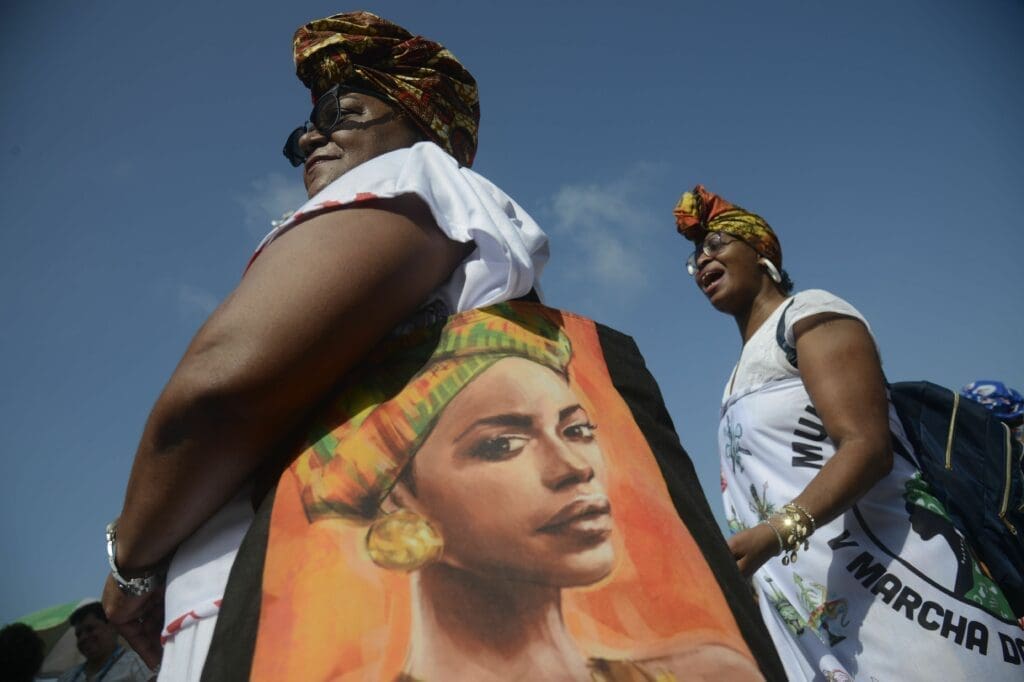Photo by: Fernando Frazão / Agência Brasil
Every July 25th, since 1992, the International Day of the Latin American and Caribbean Black Women is celebrated, to highlight the struggle and resistance of black women, as well as their achievements concerning rights and citizenship. The day also aims to draw attention to the lack of public policies to protect them, the need to fight against the persisting forms of discrimination, and the worsening of poverty.
Maria Sylvia de Oliveira, Coordinator of Policies for the Promotion of Gender and Race Equality of Geledés-Institute of Black Women, a Brazilian black feminist organization and partner of Protection International, shares her thoughts:
I recently read a text that states that in times of crisis, women are the first to have their rights suppressed. At the intersection of gender and race, black women and girls have historically been systematically denied access to basic, fundamental rights. The terrible living conditions of the vast majority of the black population in Brazil are widely known: we have an abundance of statistical data that proves the extreme levels of inequality concerning access to material and symbolic goods and the lethal consequences of this inequality.
The pandemic crisis has placed a spotlight on the huge gap of inequalities and the precarious living conditions of almost half of the Brazilian population, the inequities that plague, not by simple coincidence, the life of the black population in Brazil. The impacts of the pandemic on labor activities (formal or informal) put this portion of the population in a situation of hunger and extreme poverty, with black women and girls being the most affected by this health crisis. To allow, through omission, that nearly 20 million people return to the hunger map is to promote genocide.
In July 2021, a year and four months into experiencing an unprecedented health crisis, we recorded more than 530,000 deaths by COVID-19. This crisis is most gravely affecting the poorest populations and the State’s responses to contain the coronavirus, especially when we talk about the poor, peripheral population, who are mostly black, were extremely insufficient and inefficient. The data show that blacks are 62% more likely to die from COVID-19 than the non-black population.
Racism is expressed through the complete omission of the State, which was very evident in this moment of pandemic, deepening inequalities in recent years and increasing violence and human rights violations of the black population. This was painfully apparent for black women and girls, as this portion of the population represents the main group experiencing poverty in Brazil. This is coined the expression ‘matriarchy of misery’ as Sueli Carneiro pointed out in his text of the same title of September 2000. Sueli’s text is terrifyingly topical 21 years later:
“The expression matriarchy of misery was coined by the black and northeastern poet Arnaldo Xavier to designate the historical experience of black Brazilian women in Brazilian society marked by exclusion, discrimination, and social rejection, and, despite these conditions, their role of resistance and leadership in their miserable communities.”
The available social indicators continue to ratify Arnaldo Xavier’s term, and these women continue to wait for concrete measures to be implemented to reverse this ‘matriarchy of misery’.
We know that promoting hunger is one of the strategies to try to control black bodies, a way of undermining our ability to react, to organize.
In the current scenario, the performance of social movements is considered anti-State and, in this sense, these movements are treated as enemies. They are criminalized, strategies are imposed to inhibit their actions and freedom of expression, and the State uses the national security law in an attempt to silence opponents. For example, this is what we are experiencing today in post-coup Brazil, as these movements are resisting the violations of rights provided for and enshrined by the Federal Constitution. We are experiencing the total dismantling of social policies that are being carried out in favor of a false austerity policy imposed by conservative and fundamentalist forces, in a very violent way.
There has been a significant increase in the number of murders of human rights defenders in recent years, with the death of Marielle Franco, in Rio de Janeiro, serving as a strong example of this violence.
We live in an environment that is hostile to this government, which is pushing back against our racially conscious agenda.
We are on our own.


